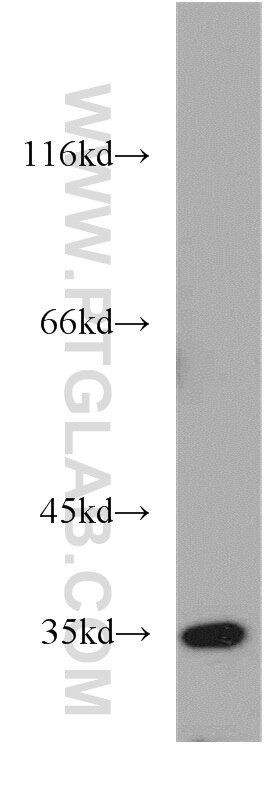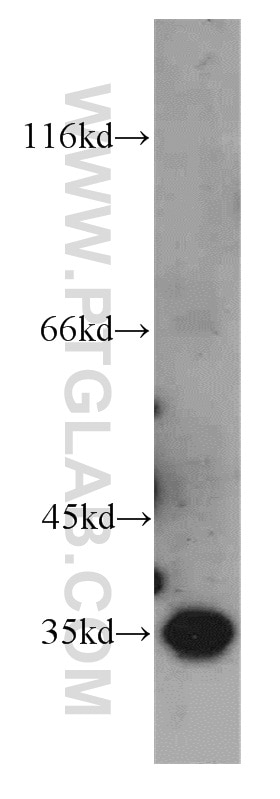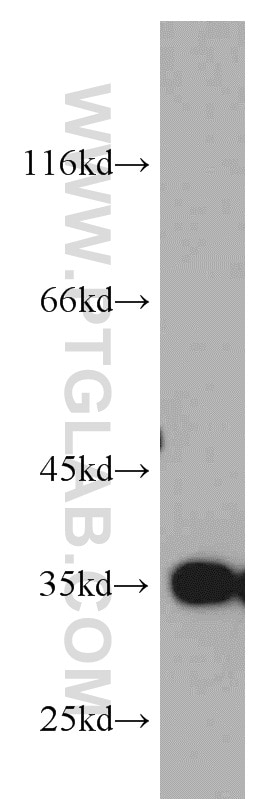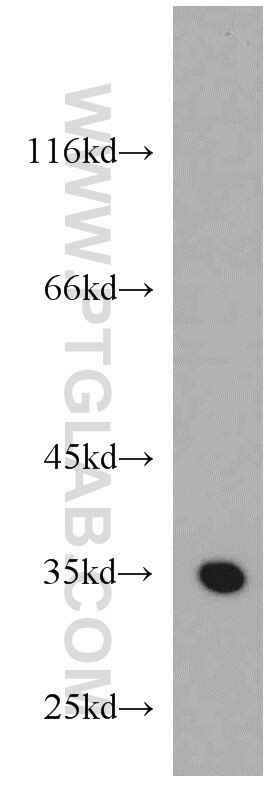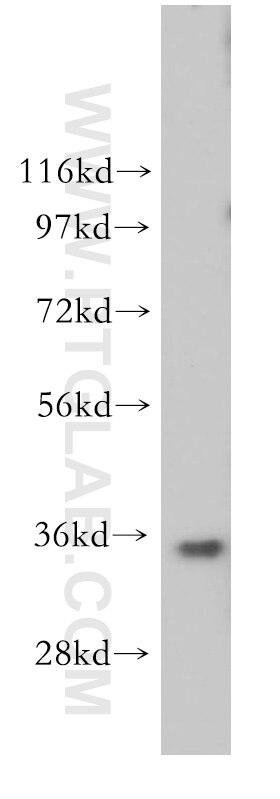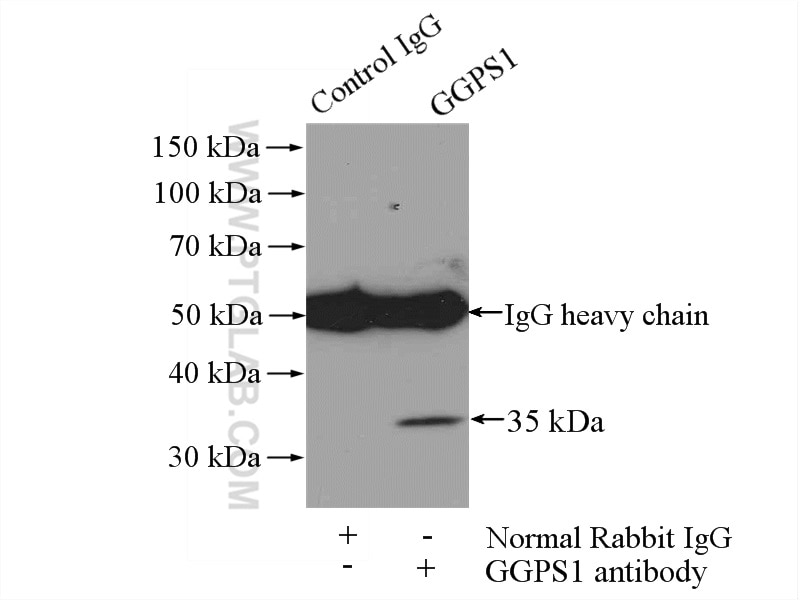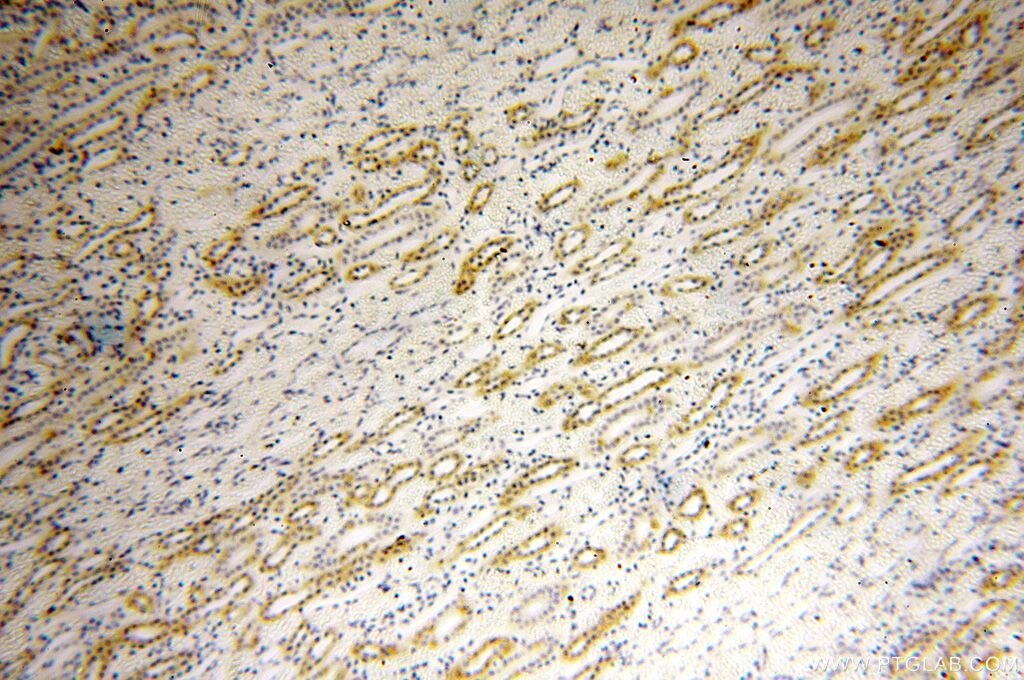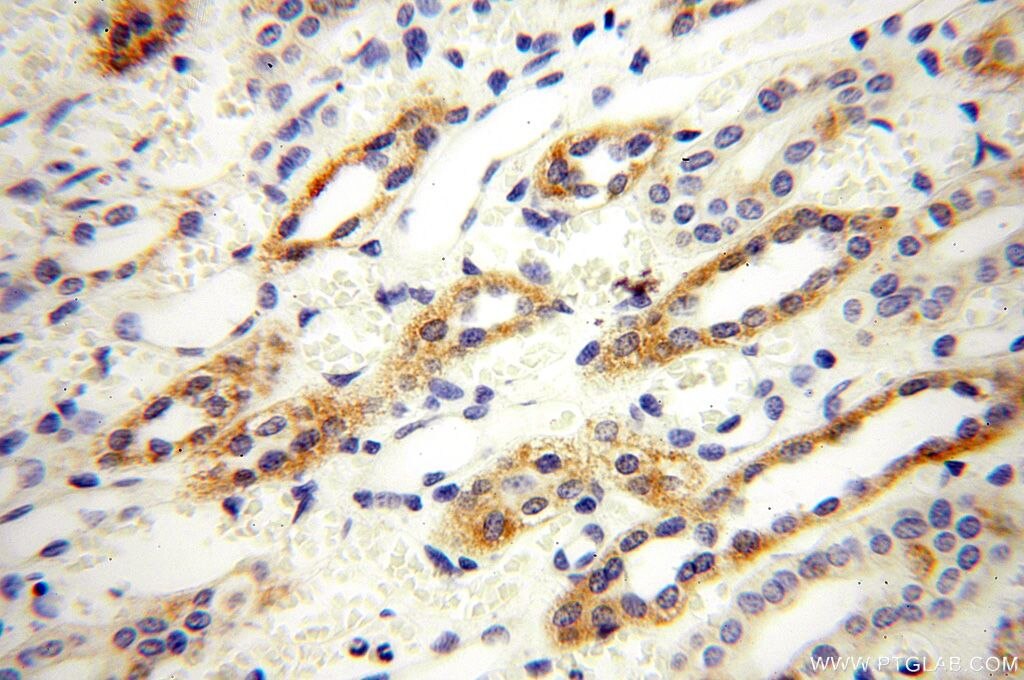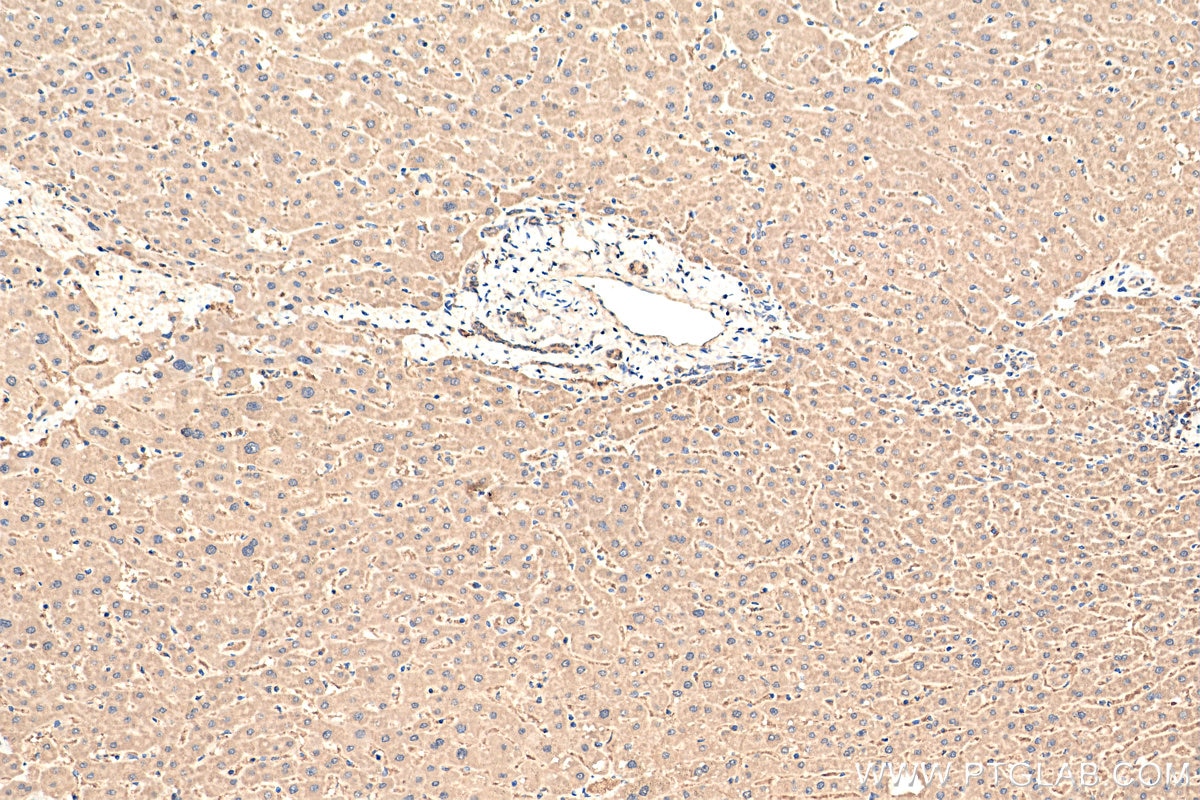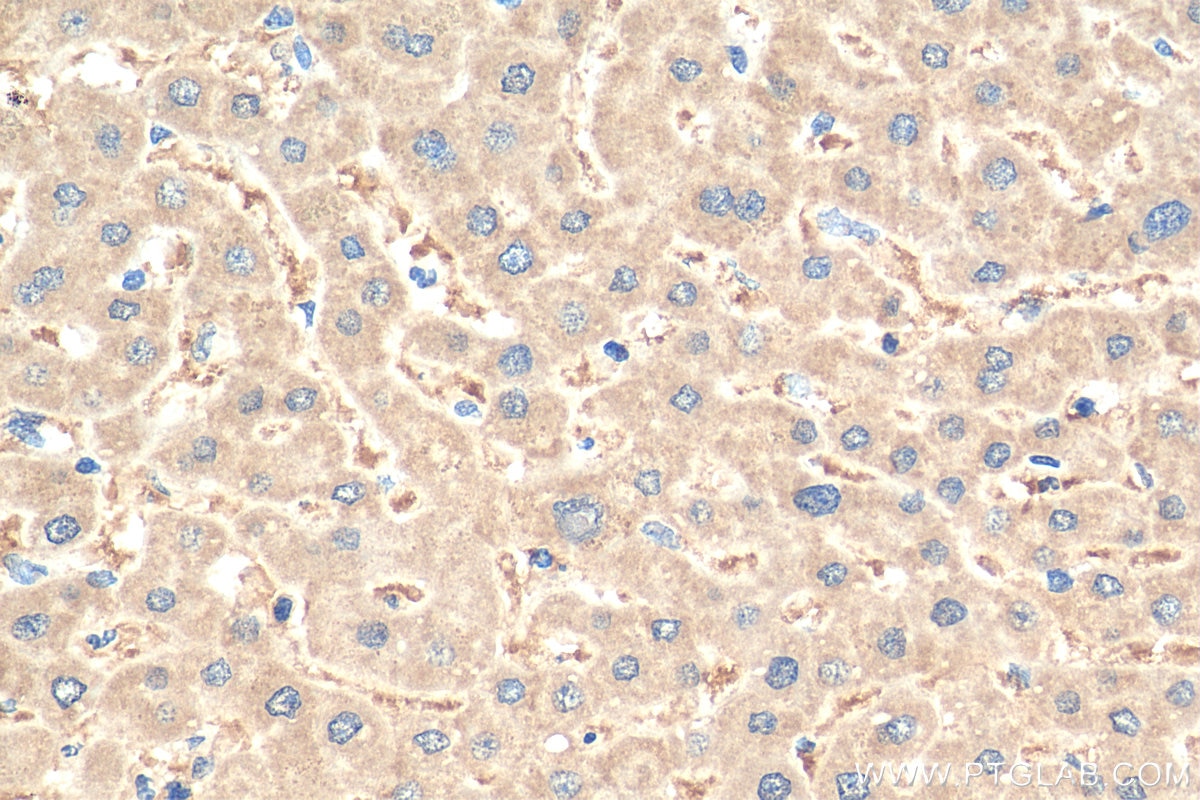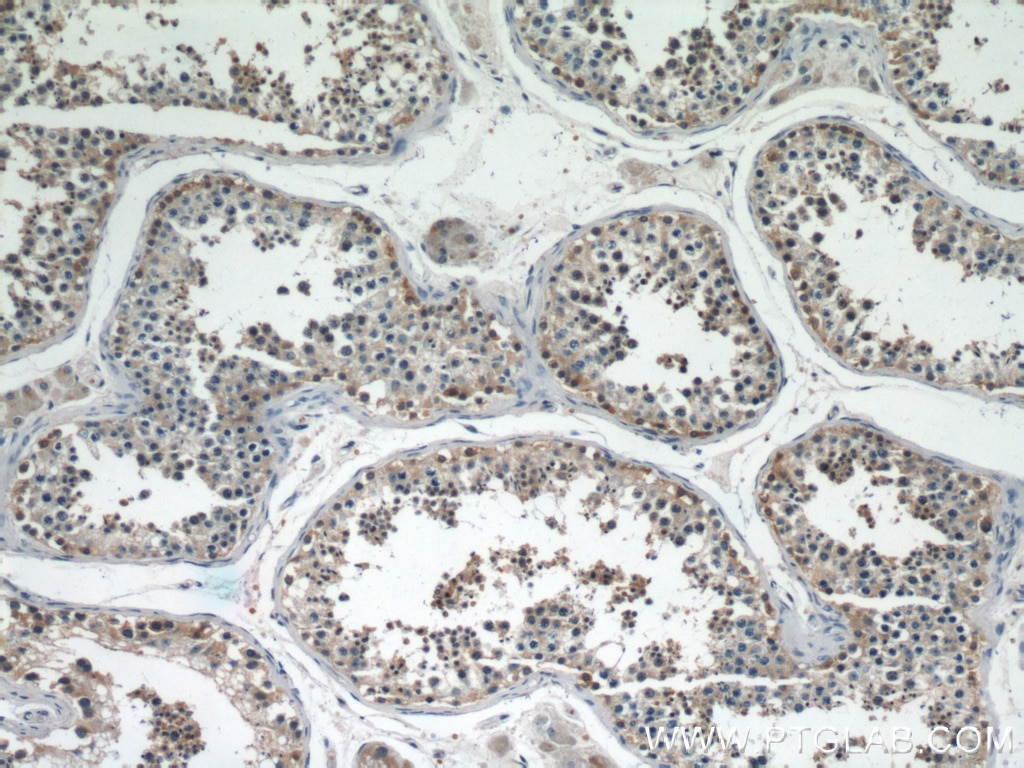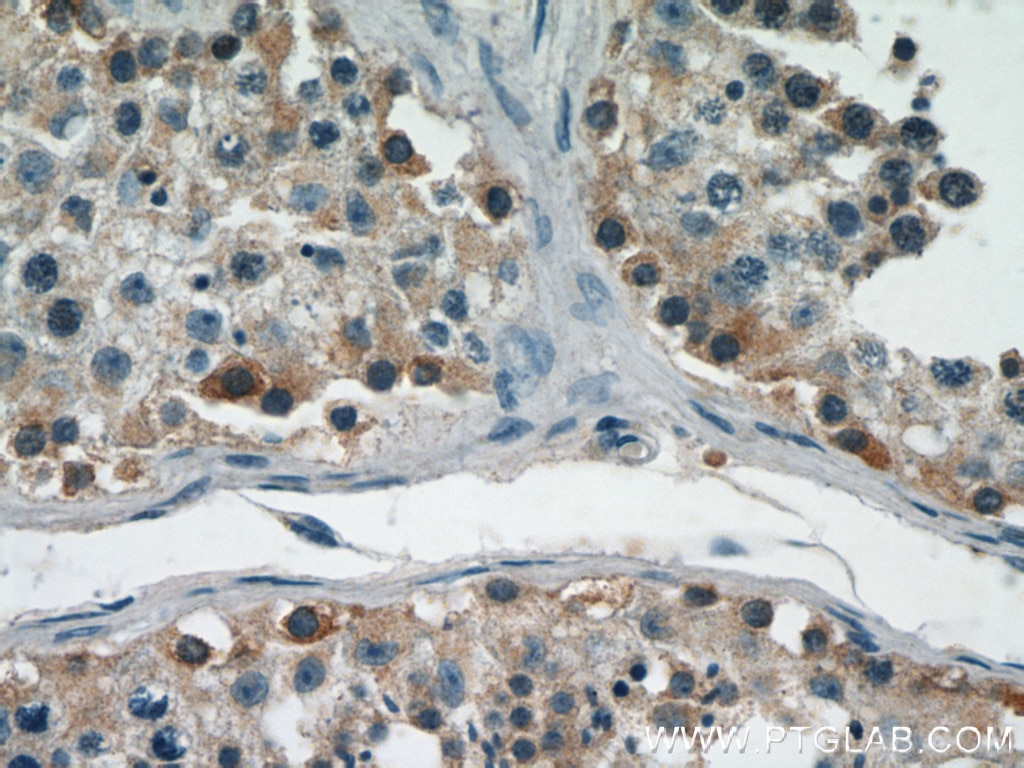Validation Data Gallery
Tested Applications
| Positive WB detected in | mouse brain tissue, human placenta tissue, human testis tissue, mouse bladder tissue, human heart tissue |
| Positive IP detected in | mouse brain tissue |
| Positive IHC detected in | human kidney tissue, human liver tissue, human testis tissue Note: suggested antigen retrieval with TE buffer pH 9.0; (*) Alternatively, antigen retrieval may be performed with citrate buffer pH 6.0 |
Recommended dilution
| Application | Dilution |
|---|---|
| Western Blot (WB) | WB : 1:500-1:1000 |
| Immunoprecipitation (IP) | IP : 0.5-4.0 ug for 1.0-3.0 mg of total protein lysate |
| Immunohistochemistry (IHC) | IHC : 1:20-1:200 |
| It is recommended that this reagent should be titrated in each testing system to obtain optimal results. | |
| Sample-dependent, Check data in validation data gallery. | |
Published Applications
| KD/KO | See 4 publications below |
| WB | See 8 publications below |
| IHC | See 8 publications below |
| IF | See 3 publications below |
| FC | See 1 publications below |
Product Information
14944-1-AP targets GGPS1 in WB, IHC, IF, IP, ELISA applications and shows reactivity with human, mouse samples.
| Tested Reactivity | human, mouse |
| Cited Reactivity | human, mouse |
| Host / Isotype | Rabbit / IgG |
| Class | Polyclonal |
| Type | Antibody |
| Immunogen |
CatNo: Ag6745 Product name: Recombinant human GGPS1 protein Source: e coli.-derived, PGEX-4T Tag: GST Domain: 1-300 aa of BC067768 Sequence: MEKTQETVQRILLEPYKYLLQLPGKQVRTKLSQAFNHWLKVPEDKLQIIIEVTEMLHNASLLIDDIEDNSKLRRGFPVAHSIYGIPSVINSANYVYFLGLEKVLTLDHQDAVKLFTRQLLELHQGQGLDIYWRDNYTCPTEEEYKAMVLQKTGGLFGLAVGLMQLFSDYKEDLKPLLNTLGLFFQIRDDYANLHSKEYSENKSFCEDLTEGKFSFPTIHAIWSRPESTQVQNILRQRTENIDIKKYCVHYLEDVGSFEYTRNTLKELEAKAYKQIDARGGNPELVALVKHLSKMFKEENE 相同性解析による交差性が予測される生物種 |
| Full Name | geranylgeranyl diphosphate synthase 1 |
| Calculated molecular weight | 35 kDa |
| Observed molecular weight | 35 kDa |
| GenBank accession number | BC067768 |
| Gene Symbol | GGPS1 |
| Gene ID (NCBI) | 9453 |
| RRID | AB_2110990 |
| Conjugate | Unconjugated |
| Form | |
| Form | Liquid |
| Purification Method | Antigen affinity purification |
| UNIPROT ID | O95749 |
| Storage Buffer | PBS with 0.02% sodium azide and 50% glycerol{{ptg:BufferTemp}}7.3 |
| Storage Conditions | Store at -20°C. Stable for one year after shipment. Aliquoting is unnecessary for -20oC storage. |
Background Information
GGPS1(Geranylgeranyl pyrophosphate synthase) belongs to the FPP/GGPP synthase family and catalyzes the synthesis of GGPP, an important molecule responsible for the C20-prenylation of protein and for the regulation of a nuclear hormone receptor. GGPP synthase puri¢ed from bovine brain is reported to be a homo-oligomer (150-195 kDa) with a molecular mass of 37.5 kDa for the monomer. This is consistent with the calculated molecular mass (35 kDa) of mouse and human GGPP synthases (PMID:10101267).
Protocols
| Product Specific Protocols | |
|---|---|
| IHC protocol for GGPS1 antibody 14944-1-AP | Download protocol |
| IP protocol for GGPS1 antibody 14944-1-AP | Download protocol |
| WB protocol for GGPS1 antibody 14944-1-AP | Download protocol |
| Standard Protocols | |
|---|---|
| Click here to view our Standard Protocols |
Publications
| Species | Application | Title |
|---|---|---|
Dev Cell Quantitative proteomic profiling identifies global protein network dynamics in murine embryonic heart development | ||
FEBS J Conditional Loss of Geranylgeranyl Diphosphate Synthase Alleviates Acute Obstructive Cholestatic Liver Injury by Regulating Hepatic Bile Acid Metabolism. | ||
Am J Pathol Geranylgeranyl Diphosphate Synthase Modulates Fetal Lung Branching Morphogenesis Possibly through Controlling K-Ras Prenylation. | ||
J Cell Mol Med Overexpression of geranylgeranyl diphosphate synthase contributes to tumour metastasis and correlates with poor prognosis of lung adenocarcinoma.
| ||
Cells Cysteine-Rich LIM-Only Protein 4 (CRP4) Promotes Atherogenesis in the ApoE-/- Mouse Model. | ||
J Hepatocell Carcinoma miR-612 Enhances RSL3-Induced Ferroptosis of Hepatocellular Carcinoma Cells via Mevalonate Pathway |

